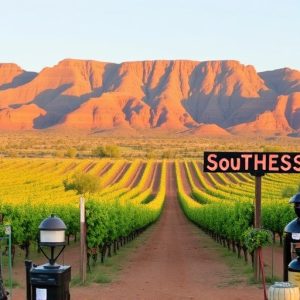Southern Arizona's wineries stand out nationally for their adoption of dry farming techniques, a sustainable method that conserves water, enhances terroir, and promotes healthier vines. Despite water scarcity challenges, this ancient practice thrives in the region's arid climate through strategic row spacing, organic compost, and drought-resistant grape varieties. The result is exceptional, distinctive wines that reflect Southern AZ's unique character, attracting wine enthusiasts seeking eco-conscious experiences.
“Uncover the remarkable world of sustainable viticulture in Southern Arizona’s thriving wine region. This article takes you on a journey through the unique practices and innovative techniques that define its wineries. From dry farming methods that challenge conventional wisdom to their commitment to environmental stewardship, these southern AZ wineries are revolutionizing the industry. Learn how water conservation enhances wine quality, explore tour options for an immersive experience, and discover why this region is becoming a destination for wine enthusiasts seeking sustainable delights.”
- Uncovering the Unique Practices of Southern AZ Wineries
- The Rise of Dry Farming in the Region's Vineyards
- Environmental Sustainability: How These Winemakers Protect the Land
- Exploring the Benefits of Water Conservation Techniques
- Tasting Notes: The Impact on Wine Quality and Flavor
- A Traveler's Guide to Experiencing Sustainable Vineyard Tours
Uncovering the Unique Practices of Southern AZ Wineries
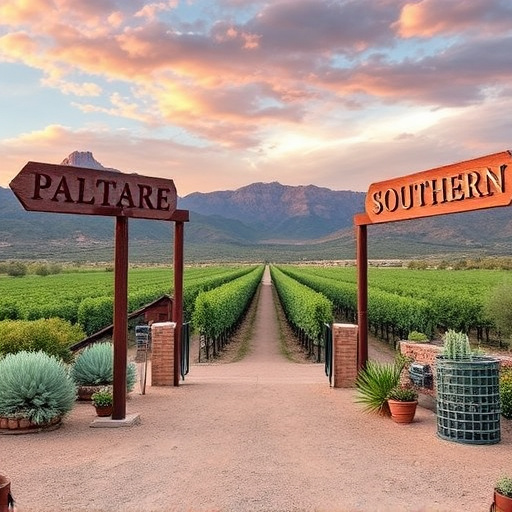
In the heart of Southern Arizona, a unique and sustainable viticultural landscape unfolds, where wineries embrace dry farming techniques, setting them apart from their counterparts elsewhere. These southern AZ wineries are not just producing exquisite wines; they’re also guardians of an ancient agricultural practice that respects the land’s natural rhythms. Dry farming, an age-old method, involves minimal irrigation, relying on deep soil moisture and strategic planting to ensure grapevines thrive during arid summers. This approach not only conserves water but also fosters healthier, more resilient vines, contributing to a distinct wine character that reflects the region’s unique terroir.
Beyond sustainability, dry farming offers winemakers in Southern Arizona creative freedom in choosing grape varieties and managing harvests. The challenge of limited water resources prompts innovative solutions, such as strategic row spacing, organic compost enriching the soil, and careful selection of drought-resistant grape cultivars. These practices not only ensure the long-term viability of vineyards but also produce wines with intense flavors and aromas that capture the essence of this remarkable region, making southern AZ wineries a must-visit destination for wine enthusiasts seeking authentic, sustainable experiences.
The Rise of Dry Farming in the Region's Vineyards
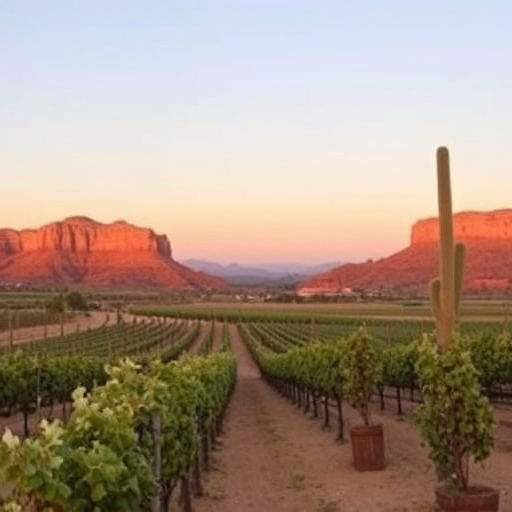
In recent years, the southern Arizona wine region has witnessed a significant shift towards sustainable farming practices, with dry farming emerging as a prominent technique among local vineyards. This ancient method, which relies entirely on rainwater and minimal irrigation, is gaining traction due to its environmental benefits and ability to produce high-quality grapes. As southern Arizona’s wineries strive for ecological stewardship, dry farming offers a promising solution to conserve water, reduce energy consumption, and minimize the vineyard’s overall carbon footprint.
The region’s unique climate presents both challenges and opportunities for winemakers adopting dry farming. With hot summers and relatively low rainfall, vineyards must carefully manage their water resources. By tapping into the natural cycle of rainfall and allowing the soil to absorb and store water, dry farming techniques enable vines to thrive during these challenging conditions. This approach not only ensures healthier, more resilient grapevines but also contributes to the overall sustainability and longevity of the region’s wine industry.
Environmental Sustainability: How These Winemakers Protect the Land
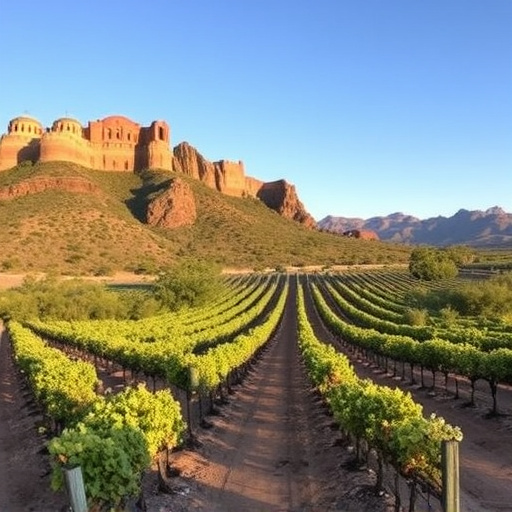
In the heart of Southern Arizona’s wine country, winemakers are embracing a unique and sustainable approach to viticulture known as dry farming. This eco-conscious practice involves minimizing irrigation, allowing the vines to draw water from deep in the soil, a method that not only conserves precious resources but also fosters a healthier ecosystem. By forgoing traditional watering techniques, these forward-thinking producers protect the land and preserve the region’s distinctive terroir.
The impact of dry farming extends beyond water conservation. It promotes soil health by encouraging deep root systems that can better withstand drought conditions. Moreover, it reduces the reliance on chemical inputs typically used in irrigation, minimizing the potential environmental footprint of wine production. This commitment to sustainability is a key reason why Southern Arizona wineries are gaining recognition for not only their exceptional wines but also their dedication to preserving the natural beauty and biodiversity of the region.
Exploring the Benefits of Water Conservation Techniques
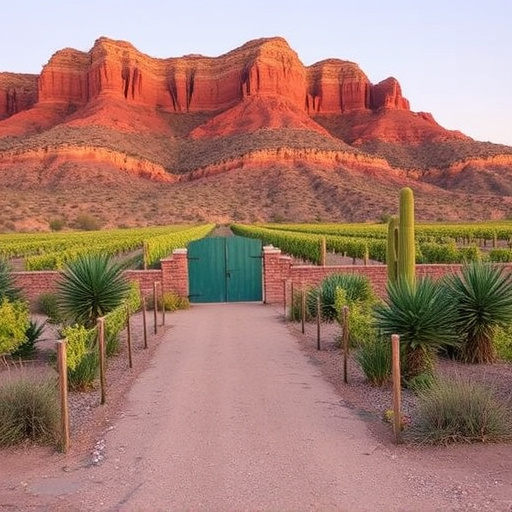
In the heart of Southern Arizona, winemakers are revolutionizing their practices by embracing water conservation techniques, particularly dry farming. This approach, gaining traction among the region’s burgeoning wineries, offers numerous environmental benefits. By forgoing traditional irrigation methods, these southern AZ wineries reduce their water footprint significantly. Dry farming encourages deep root systems in vines, allowing them to access water from deeper soil levels during droughts, ensuring resilience and sustainability even in arid climates.
Moreover, this method minimizes the energy required for pumping and delivering water, further reducing the overall carbon footprint of winemaking operations. The result is not only a healthier ecosystem but also a unique flavor profile in the wine, as dry-farmed grapes often develop intensified flavors due to stress tolerance. This sustainable practice is a shining example of how southern AZ wineries are contributing to both environmental conservation and the production of exceptional wines.
Tasting Notes: The Impact on Wine Quality and Flavor
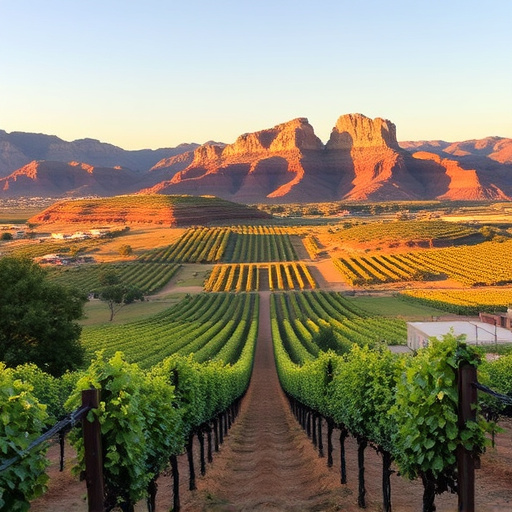
When visiting sustainable vineyards in Southern AZ, one of the most fascinating aspects to explore is the wine’s unique flavor profile. Dry farming techniques, where grapes are allowed to ripen slowly through sunlight and air rather than excessive irrigation, significantly impact wine quality. This approach results in wines with concentrated flavors, enhanced acidity, and complex aromas—all attributes highly prized by sommeliers and wine enthusiasts alike.
Tasting notes from these regions often reveal a distinct character. Wines may exhibit flavors of citrus, stone fruits, and herbs, often accompanied by earthy notes that reflect the unique terroir of the land. This focus on sustainability and dry farming not only ensures high-quality grapes but also creates memorable, nuanced wines that reflect the essence of Southern AZ wineries.
A Traveler's Guide to Experiencing Sustainable Vineyard Tours
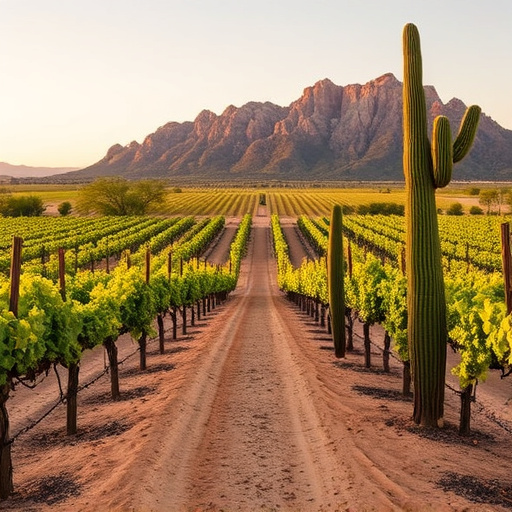
For travelers seeking a unique and eco-conscious experience, exploring sustainable vineyards in Southern AZ offers a captivating journey. These wineries embrace dry farming practices, minimizing water usage and fostering a healthier ecosystem. When visiting, expect to immerse yourself in the beauty of the landscape while learning about the art of wine-making with a reduced environmental footprint.
Guided tours often provide insights into the benefits of dry farming, allowing visitors to appreciate the terroir and understand the challenges and rewards of this sustainable approach. Many southern AZ wineries also offer tastings of their award-winning wines, made from grapes grown in these meticulous, water-wise conditions. This is an opportunity for travelers to support environmentally responsible businesses while indulging in a world-class wine experience.
Touring sustainable vineyards practicing dry farming techniques in Southern AZ offers a unique glimpse into an evolving wine industry committed to environmental stewardship. These winemakers are not just producing high-quality, distinctive wines; they’re also preserving the land and water resources that make their region special. By embracing dry farming and conservation methods, Southern AZ wineries are setting a standard for sustainable practices that travelers can enjoy and support during tours of these remarkable vineyards.
